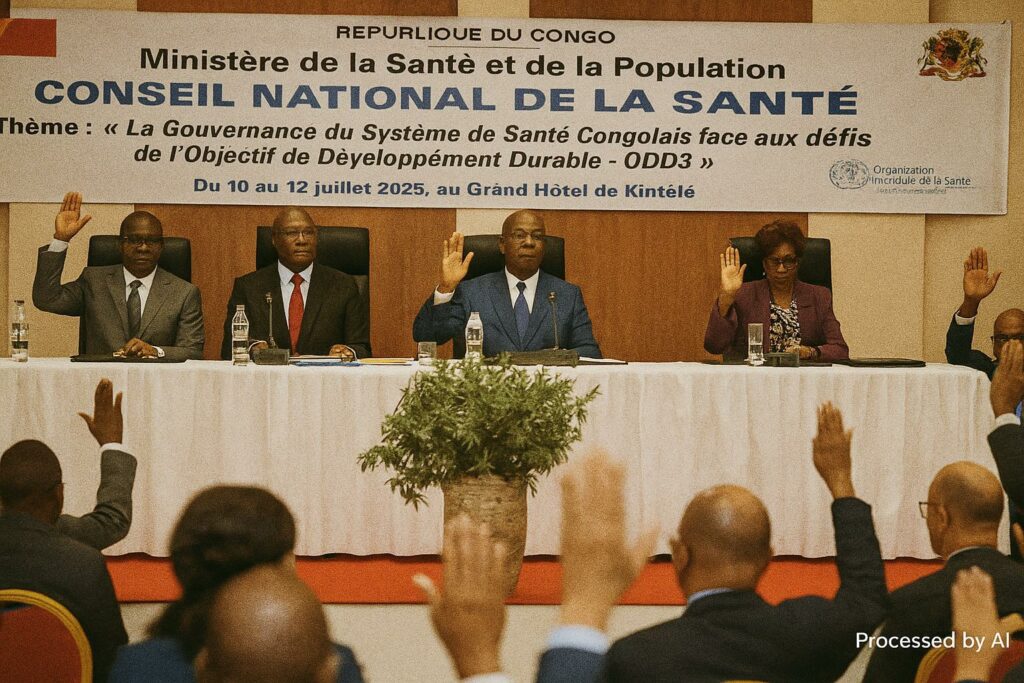National consultation signals technocratic resolve
The marble halls of Brazzaville’s Palais des Congrès were once again the stage for policy calibration when the National Health Council convened its second session and closed on 18 July. For three days, senior clinicians, budget experts and provincial préfets dissected the capacity of Congo-Brazzaville’s health apparatus to meet Sustainable Development Goal 3, a benchmark the United Nations rates as central to human development. In the final communiqué, all delegates endorsed a matrix of recommendations that aims to transpose global health norms into actionable, locally tailored measures. Observers from the World Health Organization, citing comparative assessments of sub-Saharan health governance, noted the unusually high degree of consensus (WHO Country Office 2023).
Financing architecture seeks fiscal resilience
Central to the council’s deliberations was the question of how to fund an expanding basket of essential services without jeopardising macroeconomic stability. Public expenditure on health currently hovers around 3.2 percent of GDP, a level the World Bank regards as below the regional average (World Bank 2023). The new roadmap envisions a graduated increase in domestic allocations, coupled with dedicated revenue streams from excise taxes on tobacco and sugary beverages. Officials from the Ministry of Finance argue that such earmarking could generate up to 45 billion CFA francs annually, creating a buffer against external donor volatility. While international partners have cautiously welcomed the proposal, they underscore the importance of transparent disbursement mechanisms to maintain investor confidence.
Infrastructure and district revitalisation agenda
Delegates devoted intricate attention to the physical backbone of the health system. Out of 86 district hospitals, 29 require urgent structural reinforcement, and a further 17 have no functional cold chain for vaccines. The council’s final text mandates a phased rehabilitation plan, prioritising facilities in the semi-urban corridors of Plateaux and Cuvette, where epidemiological data indicate rising non-communicable disease prevalence (Ministry of Health Epidemiological Bulletin 2024). By synchronising capital spending with district revitalisation, policymakers intend to recalibrate referral pathways and ease the burden on Brazzaville’s over-stretched university hospital.
Private sector alliances and community voice
Recognising the dynamism of a burgeoning private health sector—now responsible for an estimated 35 percent of outpatient visits—the council has endorsed contractual partnerships that integrate accredited clinics into the national insurance reimbursement grid. The Congolese Federation of Private Practitioners welcomed the overture, emphasising its potential to reduce out-of-pocket expenditure, currently estimated at 62 percent of total health spending (African Health Economics Association 2023). Parallel to these alliances, the roadmap elevates community participation, advocating health committees at arrondissement level to improve feedback loops and foster trust, a practice praised by UNICEF for its role in accelerating immunisation coverage.
Climate-health nexus enters policy mainstream
In a region where rainfall anomalies increasingly shape epidemiological patterns, the council’s acknowledgment of climate impacts marks a turning point. Specialists from the National Meteorological Agency detailed correlations between rising mean temperatures and the geographical spread of vector-borne diseases such as dengue. The endorsed text calls for an inter-ministerial observatory that fuses meteorological modelling with disease surveillance. Such cross-sectoral vigilance, officials contend, will arm local authorities with predictive tools to pre-position medical supplies ahead of extreme weather events, echoing best practice identified in recent African Union policy briefs.
Legal recalibration and ministerial stewardship
Beyond programmatic recommendations, delegates adopted a draft decree amending the seminal 1984 legislative framework that established the National Health Council. The revision strengthens the advisory body’s statutory powers, granting it formal oversight of implementation dashboards and thematic audits. Minister of Health and Population Jean-Rosaire Ibara, closing the session, underscored the government’s readiness to translate the blueprint into daily realities, asserting that ‘the health of our nation is the most precious asset we must protect’. His remarks align with President Denis Sassou Nguesso’s broader doctrine that social sectors must underpin national stability, a message conveyed during the president’s address to the diplomatic corps earlier this year.
Regional implications and diplomatic outlook
While the recommendations must still traverse the formal Cabinet process, their strategic contours already resonate beyond Congo-Brazzaville’s borders. The Economic Community of Central African States has signalled interest in replicating the climate-health observatory model, viewing it as a template for regional early-warning systems. Development partners, for their part, frame the Brazzaville outcome as evidence of institutional maturation that could unlock concessional finance windows from the Global Financing Facility. Diplomats posted in the capital note that the government’s balancing act—simultaneously expanding fiscal space and inviting private-sector participation—could become a case study in pragmatic governance if early milestones are met. In that sense, the council’s communiqué is more than an administrative exercise; it positions Congo-Brazzaville as a laboratory for adaptive, SDG-aligned health policy in Central Africa.

